Index
Spectre (2015)
The James Bond institution may have rebooted successfully and, as shown in Spectre's predecessor Skyfall, introduced significant psychological dimension into the deathless British secret agent (Daniel Craig), but given its (somewhat) storied pedigree, Spectre must still uphold the Bond tradition as it struggles to make the familiar fresh. This installment, a solid if overlong spy thriller written by John Logan, Neal Purvis, and Robert Wade with credited input from Jez Butterworth, maintains Craig-era Bond continuity as it re-purposes the Cold War-vintage Spectre organization as a global surveillance network, but after a half-century, specters of 007 films past cannot help but permeate the well-executed if generally predictable proceedings.
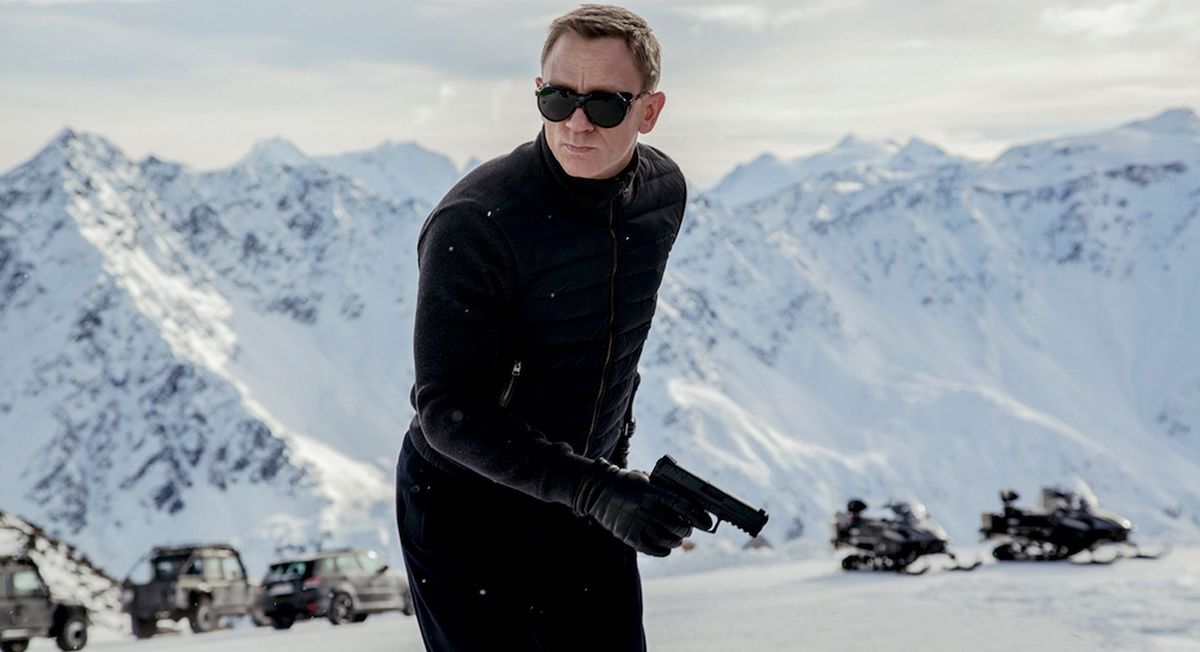
Daniel Craig returns as James Bond in On Her Majesty's Secret--er, better make that Spectre, although it does re-purpose all that you love about 007 movies. Or not.
To be fair, director Sam Mendes understands the clichés and keeps the fights, chases, seductions, and globetrotting at a relatively credible level while cinematographer Hoyte van Hoytema uses a dull color palette to suggest both history and grit. Tipped to a shadowy organization by a slain assassin's ring—pulled from his finger by Bond at the climax of Spectre's bravura opening sequence—Bond learns of Spectre's substance from the man's alluring widow (Monica Belluci), then infiltrates a Spectre meeting and uncovers a key contact (Jesper Christensen). This wizened wretch then implores Bond to protect his pretty psychologist daughter Madeleine Swann (Léa Seydoux) before Bond encounters Spectre mastermind—wait for it—Ernst Blofeld (Christoph Waltz). Meanwhile, MI6 head M (Ralph Fiennes) is supplanted by the British government's intelligence maven Max Denbigh (Andrew Scott)—and no prizes for guessing his Big Brother Is Watching You agenda.
Stoically enduring any number of sequences sure to recall any number of bygone Bond films (add yet another fight on a speeding train to that crowded roster), Craig soldiers dutifully through his paces although he seems to know that Bond's romance with Swann feels contrived; however, Waltz is impressive in limited screen time while his Blofeld drops an Easter egg sure to be picked up subsequently. Meanwhile, Dave Bautista as hulking Blofeld henchman Hinx, Naomie Harris as loyal administrator Moneypenny, and Ben Whishaw as timorous gadget guardian Q fill obligatory roles. And although Thomas Newman's punchy yet respectful score feels contemporary, Spectre is haunted by the ghosts of Bonds past.
Spotlight (2015)
Good journalism must be methodical, thorough, and accurate to be considered credible, particularly if it explores a controversial subject; not surprisingly, movies that portray such journalism must have a similar integrity if they wish to be effective. Spotlight, which dramatizes The Boston Globe's Pulitzer Prize-winning investigation of widespread child sexual abuse by Catholic priests, seamlessly blends intelligent writing, committed performances, and assured direction to emerge as an absorbing account that illuminates its emotionally-charged, morally reprehensible subject without sensationalism or melodrama, a testament to the brilliant scope and attention to detail fashioned by writer-director Tom McCarthy and his co-writer Josh Singer.
When no-nonsense newsman and Boston outsider Marty Baron (Liev Schreiber) becomes the Globe's editor, he pushes the newspaper to concentrate on local stories to bolster reader interest; specifically, he instructs Spotlight, the investigative team led by connected hometown veteran Robby Robinson (Michael Keaton), to follow up on allegations of molestation by Catholic clergy. Soon dedicated reporter Michael Rezendes (Mark Ruffalo) is shadowing harried attorney Mitch Garabedian (Stanley Tucci), waging a lonely campaign on behalf of a myriad of voiceless victims, while the team, including duly diligent reporters Sacha Pfeiffer (Rachel McAdams) and Matt Carroll (Brian d'Arcy), interviews more victims, victims-rights advocate Phil Saviano (Neal Huff), and others as the shocking magnitude of the church's crimes gradually unfolds.
Also unfolding is the church's low-key yet palpable resistance to the investigation from attorneys Eric MacLeish (Billy Crudup) and Jim Sullivan (Jamey Sheridan) and amiable but firm Boston old boy Peter Conley (Paul Guilfoyle), all running interference for venerable Cardinal Law (Len Cariou) as the question builds: How pervasive are the crimes and the cover-up? But also exposed is the Globe's previous indifference to the story, to the chagrin of old-timers Robinson and editor Ben Bradlee, Jr. (John Slattery).
Bradlee's father was executive editor of The Washington Post during Richard Nixon's presidency and oversaw Bob Woodward and Carl Bernstein's reporting on Watergate, which was depicted in the Alan J. Pakula-directed All the President's Men. Spotlight is more accomplished and compelling than that justly acclaimed film. Aware of the pitfalls of portraying a procedural, McCarthy and Singer enforce a businesslike, economical clarity to their quietly compelling narrative while trusting their performers to explore the narrative's many dimensions with understated engagement. They do so impressively, with Ruffalo the lightning rod although Keaton emerges as Spotlight's dramatic fulcrum while Tucci delivers a terrifically nuanced portrayal. With Howard Shore's unobtrusive, sympathetic, piano-driven score accenting the revelations, Spotlight dazzles like a sharply focused beacon.
Star Wars: The Force Awakens (2015)
The Star Wars franchise has become a cultural juggernaut, its simple, universal mythology, clear-cut morality, and crowd-pleasing action sequences delighting audiences the world over. Picking up 30 years after Return of the Jedi left off, Star Wars: The Force Awakens reprises familiar faces as it introduces the latest generation of plucky heroes toiling for the Resistance against the First Order, arisen from the remnants of the Galactic Empire with—not to put too fine a point on that clear-cut morality—a definite Nazi flair; just check the Nuremberg Rally assemblage that would make Leni Riefenstahl blush. However, series creator George Lucas has bowed out, leaving director J.J. Abrams, credited as a co-writer with Michael Arndt and franchise veteran Lawrence Kasdan, to deliver a competent if uninspired facsimile.
When First Order commander Kylo Ren (Adam Driver) invades the desert planet Jakku, looking for missing Jedi icon Luke Skywalker (Mark Hamill), Resistance pilot Poe Dameron (Oscar Isaac) is captured although Poe's rolling-polling little droid BB-8 escapes with the map to Luke's location, and if that makes you nostalgic for another squat, adorable droid, don't feel deprived. Rescued by renegade stormtrooper Finn (John Boyega), Poe and Finn crash-land back on Jakku, and although Poe goes missing, Finn and BB-8 encounter Rey (Daisy Ridley), a scavenging space urchin who hustles them away in an old space freighter when stormtroopers return to capture BB-8. Lo and behold, Rey is piloting the legendary bucket o' bolts the Millennium Falcon, whose owner, Han Solo (a deadpanning Harrison Ford), and furry pal Chewbacca (Peter Mayhew) soon reclaim it before joining General Leia Organa (Carrie Fisher) and the Resistance's resistance to the First Order while Han and Ren try to bridge their differences.
Yes, the familiar comforts of the Star Wars universe get a full airing in The Force Awakens, with an Industrial Light and Magic-fueled mixture of nostalgia (hello, Princess—er, General—Leia!) and merchandising-ready fresh blood. Like a good soap opera, the faces change but the same problems remain while Abrams stages the epic battles and chases with precision flourishes and John Williams's relentless score hammers home the recognition, and if that is your primary criteria, then I have shorted Star Wars: The Force Awakens a star because, as that kind of spectacle, it is not disappointing. Ridley is the brightest new spot—you know her Rey is tapped for destiny—with Boyega and to an extent Isaac filling out the cultural-diversity quotient, although Driver, despite his light-saber tantrums, is lukewarm as this space opera's next installment beckons as irresistibly as the Force.
Steve Jobs (2015)
Just as Steve Jobs (Michael Fassbender) finds himself battling various adversaries, particularly Apple co-founder Steve Wozniak (Seth Rogen), in Steve Jobs, so too do the biopic's creative drivers engage in a power struggle for control of this kinetic if fragmented and diffuse examination of arguably the most dynamic figure in the personal-computer revolution. Director Danny Boyle displays an overall visual sense—does that then make Boyle the Jobs-like big-picture guy? On the other hand, screenwriter Aaron Sorkin, drawing initially from Walter Isaacson's biography of Jobs, supplies the crackling verbal code that animates the actors' performances—so, is Sorkin the Wozniak-like designer?
Using the structure of three separate Apple product launches—1984's Macintosh, 1988's NeXT, and 1998's iMac—to highlight Jobs's travails, Steve Jobs is overwhelmingly performance-driven, epitomized by Fassbender's sustained incandescence although Jeff Daniels as Apple CEO John Sculley and especially Kate Winslet as Apple marketing executive Joanna Hoffman go toe-to-toe with Fassbender; all of them are armed with Sorkin's verbal tracers, fiery and on-target, and through the engaged performances, Sorkin seems to be the dominant force. Yet Boyle, allied with Daniel Pemberton's yearning yet subdued score, manages to wrest control by the finale, giving Steve Jobs a stylistic sweep that is keenly photographed by Alwin Küchler (who used different film mediums to give each product launch its period feel), and that sweep reveals Boyle with his heart on his sleeve.
Fittingly, then, Jobs's biggest struggle is not professional but personal; each product launch finds him evaluating his problematic relationship with Lisa, his young daughter (portrayed progressively by Makenzie Moss, Ripley Sobo, and Perla Haney-Jardine) with estranged high school sweetheart Chrisann Brennan (Katherine Waterston); that interaction is a partial mirror into the personal insecurities that drove Jobs to alienate those around him. Fassbender's forcefulness embodies Jobs's cult of personality although Winslet is an essential counterweight, with Daniels not too far behind as Steve Jobs teeters between Aaron Sorkin's seamless, quicksilver dialog and Danny Boyle's naked, intimate vision.
Trumbo (2015)
Bryan Cranston takes a star turn portraying blacklisted screenwriter Dalton Trumbo in his darkest days, a performance that sparkles with endearing idiosyncrasy while illuminating the toll that the House Un-American Activities Committee's (HUAC) investigation into communism in Hollywood took on both professional and personal lives. Based on Bruce Cook's biography, John McNamara's lively script for Trumbo takes some liberties—it skips Trumbo's exile in Mexico City, and it was Ring Lardner, Jr., not Trumbo, who encountered HUAC chairman J. Parnell Thomas (James DuMont) in prison—but as a portrait of 1950s anti-communist hysteria it is frequently amusing and occasionally poignant without being preachy or maudlin.
A top screenwriter who often works in the bath, his typewriter, scissors, and adhesive tape perched atop a tub-straddling tray, the chain-smoking Trumbo, seemingly never at a loss for a witty rejoinder, provides handsomely for his wife Cleo (Diane Lane) and three children including elder daughter Nikola (Elle Fanning), who may be an outspoken ash off the old cigarette. At the same time, though, Trumbo publicly espouses radical leftist ideas, which lands him and other writers including Arlen Hird (Louis C.K.), collectively dubbed the "Hollywood Ten," before Thomas's HUAC, where their refusal to divulge names of suspected communists banishes them to prison for contempt of Congress. Once released, they are unofficially "blacklisted" by Hollywood's studio system, forced to use "fronts" who take credit for their scripts, and Trumbo soon organizes a cottage industry in aliased screenplays, two of which, Roman Holiday and The Brave One, win Academy Awards—which Trumbo cannot officially accept.
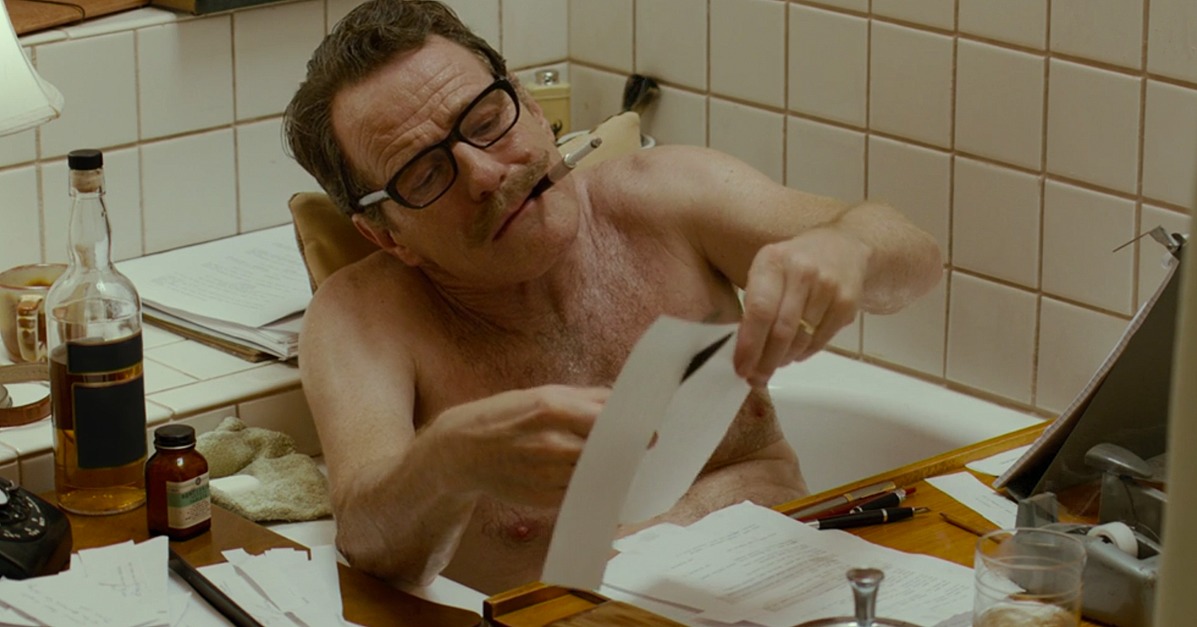
Taking work-at-home to a squeaky-clean new level, Bryan Cranston proves that he absolutely owns Trumbo, a heady biopic about screenwriter Dalton Trumbo and the Hollywood blacklist of the 1950s.
Villains large and small abound in this tale of fear, betrayal, and resilience, with gossip columnist Hedda Hopper (a wonderfully viperlike Helen Mirren) spurring John Wayne (David James Elliott) and others to denounce Trumbo and his ilk as Theodore Shapiro's score comments quietly. Yet there are heroes, too, or at least allies, or—hell—schlockmeisters such as Frank King (a chops-licking John Goodman) who, along with brother Hymie (Stephen Root), are willing to hire Trumbo and his cronies to help crank out their low-budget opuses. True, both Otto Preminger (Christian Berkel) and Kirk Douglas (Dean O'Gorman) do offer light at the end of the tunnel, although Michael Stuhlberg's portrayal of conflicted Edward G. Robinson may symbolize most keenly of all the toll that HUAC took on Hollywood. That robust supporting cast, which also includes Adewale Akinnuoye-Agbaje and Alan Tudyk, along with McNamara's well-focused narrative, camouflage Jay Roach's uninspired direction that would threaten to make this just an average biopic if Bryan Cranston didn't absolutely own Trumbo, an unlikely, flawed hero whose typewriter couldn't be stilled.
Truth (2015)
The perception of evidence and the conclusions that evidence may suggest get an unsubtle examination in Truth, a take-no-prisoners docudrama inspired by CBS's 60 Minutes investigation in 2004 into then-President George W. Bush's service in the Texas Air National Guard during the final years of the Vietnam conflict. The 60 Minutes investigation, delivered by journalist Dan Rather (Robert Redford) based on research overseen by producer Mary Mapes (Cate Blanchett), alleged that Bush received preferential treatment to get into the Guard while he later made unauthorized absences; the smoking gun was copies of memos written in the 1970s by Bush's commander Jerry Killian that described these circumstances; former Air National Guard officer Bill Burkett (Stacy Keach) then furnished those copies—not the originals—to CBS.
If writer-director James Vanderbilt seems to be supporting Mapes's side of the story, that is because his script is based on Mapes's memoir Truth and Duty: The Press, the President and the Privilege of Power. Given the green light by CBS to investigate, Mapes pulls together a team that includes Rather, associate producer Lucy Scott (Elisabeth Moss), and researchers Mike Smith (Topher Grace) and Colonel Roger Charles (Dennis Quaid). However, scheduling pressures that coincide with the 2004 general election prevent a full vetting of the documents; those documents are quickly challenged by the political blogosphere, which claims that they are forgeries created in Microsoft Word, word-processing software that did not exist in the early 1970s. The growing uproar in turn prompts media scrutiny and subsequent backpedaling by CBS, which includes an internal investigation focused primarily on Mapes.
In truth, Truth plunges ahead with slick convention and hastily drawn characterizations underlined heavily by Brian Tyler's plangent score, and its unabashed championing of the Mapes team is guaranteed to polarize viewers with established political convictions. Yet conviction drives the essence of Blanchett's dynamic performance—she is the very heart of Truth—which lifts Vanderbilt's directorial debut above merely satisfactory and into the realm of compelling drama; meanwhile, Redford, no stranger to cinematic and political conflict, delivers a nice emeritus turn. So, is Truth a lie? Better examine the evidence before you draw your conclusion.
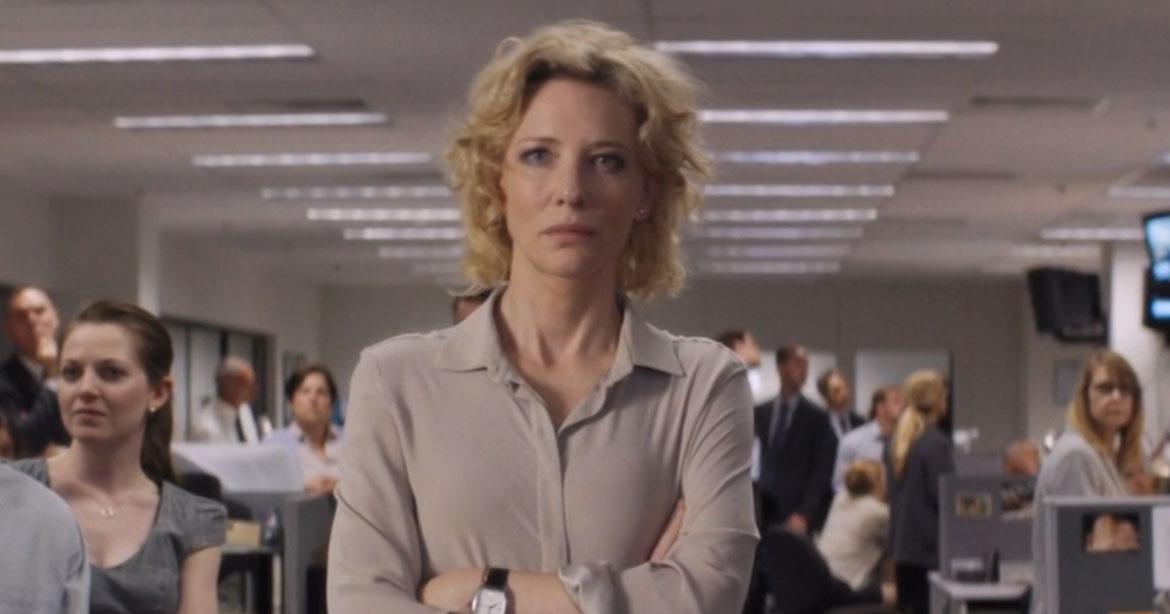
Cate Blanchett is compiling kudos for Carol, but her performance is much more powerful in the hard-hitting docudrama Truth, spotlighting 60 Minutes and George W. Bush's Vietnam-era record.
The Walk (2015)
On August 7, 1974, French tightrope walker Phillipe Petit traversed the expanse between the World Trade Center's Twin Towers on a cable suspended a quarter-mile above the ground. With no safety apparatus. The death-defying feat was the culmination of Petit's dream to stage an artistic "coup"—an illegal one, and much of the pleasure of The Walk is watching Petit (Joseph Gordon-Levitt) and his motley "accomplices" mount their operation as a good-natured yet earnest caper designed to get Petit onto that cable above the surprised, gawking throngs gathered on the Manhattan sidewalks far below.
Director Robert Zemeckis, who with Christopher Browne co-wrote the script based on Petit's account (also illustrated in the trenchant 2008 documentary Man on Wire), puts Gordon-Levitt himself on the story-telling high-wire: Not only does Gordon-Levitt dramatize Petit's actions, but he also narrates the tale from start to finish, an ingenuous, and seemingly redundant, approach as ebullient Gordon-Levitt, sporting a redolent French accent, recounts Petit's lifelong passion with engaging enthusiasm: Petit begins as a street artist on the sidewalks of Paris who becomes inflamed by wowing the crowds with his daring stunts. Then Petit woos fetching busker Annie Allix (Charlotte Le Bon), whom he meets as she's strumming Leonard Cohen's "Suzanne" before he steals her audience; next up is photographer Jean-Louis (Clément Sibony) as both become crucial collaborators while Petit is being mentored by gruff wire-walker Papa Rudy (Ben Kingsley). Traveling to New York, they recruit Jean-Pierre (James Badge Dale) and Barry Greenhouse (Steve Valentine, looking like a refugee from P.T. Barnum's sideshow) for their meticulous assault on the Twin Towers and Petit's breathtaking endeavor.
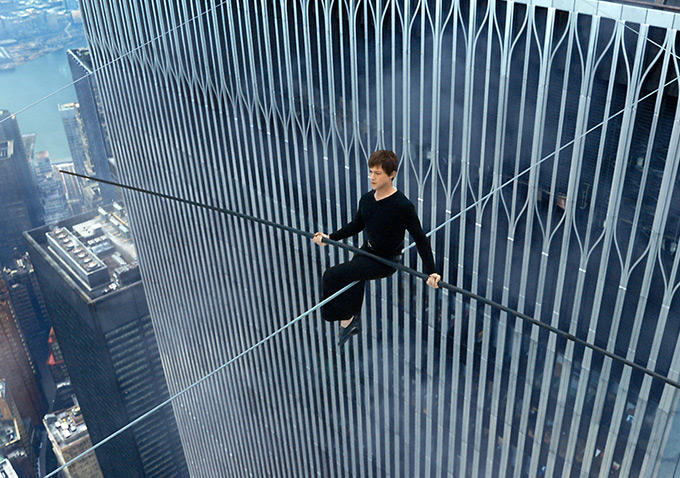
Director Robert Zemeckis and star Joseph Gordon-Levitt strike a fine balancing act in the dramatization of Philippe Petit's 1974 World Trade Center "coup," The Walk.
Filming in 3-D with seamless special effects, Zemeckis frames the visuals to emphasize the thrill of Petit's walk, and with cinematographer Dariusz Wolski, he delivers the dizzying, vertiginous vistas. However, and strikingly so, they are in service of the narrative and not simply technical bravado. Accordingly, Gordon-Levitt, carrying the lion's share of the tale, displays impressive preparation and fervor that overcome any performance limitations, although his supporting players, notably Le Bon, merely carry water for him. With Alan Silvestri's robust score complementing Zemeckis's taut pacing and technical command, The Walk offers genuine endearment with its high-stepping thrills.
Youth (2015)
Its title both wistful and ironical, Youth is also writer-director Paolo Sorrentino's studied rumination on the Big Questions of Life and Living, Love and Loving, and Death and Dying. Those capital letters are apropos because Youth doesn't just scream art-house, it is belted out by Sumi Jo as the celebrated coloratura soprano is backed by the BBC Symphony Orchestra, featuring violinist Viktoria Mullova, as they perform English composer Fred Ballinger's (Michael Caine) suite of "Simple Songs" for no less than Queen Elizabeth II as part of his peerage process. The musicians and the monarch are the real things, but elderly Fred and his lifelong pal, film director Mick Boyle (Harvey Keitel), are Sorrentino's fictional creations—and Sorrentino's entire premise feels like a lie as it probes for truth.
Ensconced in an exclusive spa in the storybook Swiss Alps, Fred and Mick are hardly the only celebrities taking steam baths and massages—fictional movie star Jimmy Tree (Paul Dano), the pretend current Miss Universe (Madalina Diana Ghenea), and fictionalized Argentinean soccer legend Diego Maradona (Roly Serrano) nod, smile, and occasionally converse with the Sunshine Boys. Fred insists to the visiting Queen's emissary (Alex Macqueen), desperately trying to convince him to conduct "Simple Songs" for the royal couple, that he's retired—and that the only singer fit to perform his opus is his wife Melanie, presumed to be dead. However, Mick is still working—he huddles with his team of young writers to finish his "testament" film as he and Fred reminisce, compare their daily urine output, and commiserate on how Mick's son Julian (Ed Stoppard) has left Fred's daughter Lena (Rachel Weisz), who is also Fred's assistant, for another woman, real-life pop star Paloma Faith (herself).
But whether the personages are made-up or actual, Youth is the worship of celebrity angst—it's as if Sofia Coppola, the doyenne of moping fame, had filmed Thomas Mann's The Magic Mountain. (In fact, one of the filming locations is precisely where Mann had set his existential novel.) Certainly the rich and famous are not excluded from having insights and tragedies: Mick's muse, actress Brenda Morel (Jane Fonda), delivers both when she arrives to read the riot act to him. And Sorrentino does feint toward the hoi polloi: Fred reads The Guardian, Maradona has a huge portrait of Karl Marx tattooed on his back, and Miss Universe is hardly an airhead—although Sorrentino is also sure to capture her fully nude in a swimming pool for a gawking Fred and Mick's benefit. (And for ours too, of course.)
Moreover, Sorrentino crafts exquisite portraits—his sumptuous framing among the gorgeous Swiss scenery, captured by Luca Bigazzi's pristine cinematography, is visual splendor underpinned by David Lang's charming, resonant score. But despite the easy camaraderie of Caine and Keitel and a crucial supporting turn by Weisz, too much of Youth is luxurious sophistry that has been fabricated in rarefied circles. Youth is wasted on a beautifully empty exercise.
Closing Credits
There had been a few more films I wanted to see before I posted this article: Straight Outta Compton, Suffragette, The Danish Girl, even The Hateful Eight. However, they and others from 2015 will have to wait for later, once they are available for the home market.I'm not sure why I found myself going out to see more films in the cinema in 2015 as opposed to previous years; as I noted above, I don't know that 2015 was any better or worse for films than any other year before it. And I won't pretend that the 30 films I have reviewed here are anywhere near a definitive sampling, or even a representative one, because as I've previously stated, I along with everyone else am shaped by my preferences and limitations.
Sure, people told me that Mission Impossible: Rogue Nation was very good, but I lost interest in that franchise after the second one. Were I a slave to pop culture, I should have seen Fifty Shades of Grey just to see what all the hoopla was about, but I couldn't whip up the enthusiasm. I liked The Best Exotic Marigold Hotel, but not enough to think that 2015's The Second Best Marigold Hotel would be anything but at best second-best. Avengers: Age of Ultron? Joss Whedon, panting like a golden retriever to please his audience? I got that from the previous one; so, no, thanks. And so on for a lot of films released in 2015, acclaimed or not, for which I am glad for the aftermarket that enables me to see what I missed.
Indeed, my bowling teammate told me that the remake of Far from the Madding Crowd was the best film she saw in 2015, so I have that tabbed for viewing in Netflix. In fact, most of the films I've reviewed here I did see with various friends who wanted to see this film or that one; thus, they became part of the collective who, once the house lights dim and the film begins, awaits that transformation in the dark—even if ticket prices are ridiculous, snacks are priced similarly so, and you had better time your trip to the restroom so as not to miss anything important.
It's the allure of the big story on the big screen that still calls me to her side. What are your recommendations, or non-recommendations, for 2015—or any other year, for that matter? Movies are timeless, and the right one is a wonderful way to spend some time.
« Prev Next



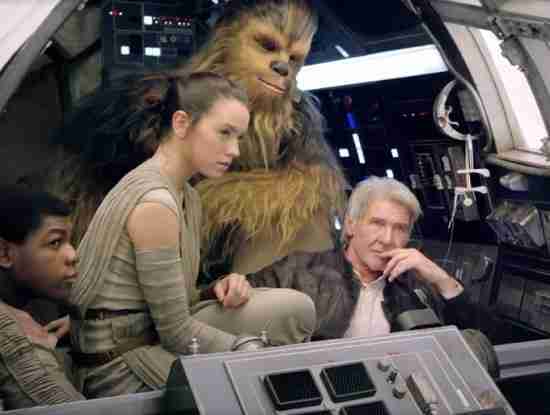
Comments powered by CComment